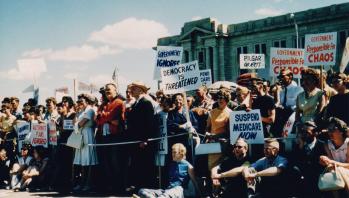
In July 1962, doctors in Saskatchewan began a provincewide general strike that marked the peak of a conflict between organized medicine and its allies against the government's medicare bill. One of the great crucibles of provincial history, the issues surrounding the strike divided communities and even families. Since it led a national debate on the merits of universal health insurance, interest in the strike went far beyond the province, and for three weeks national and foreign media focused on the strike in Saskatchewan.
The origins of the strike lay in Premier T.C. Douglas' promise, in a by-election speech in Birch Hills, Saskatchewan, in April 1959, to introduce a pre-paid, universal and publicly managed system of primary physician care. Commonly known as “medicare,” this initiative was to complement universal hospital insurance introduced the decade before with the support of most doctors. In the 1950s, however, organized medicine in Saskatchewan became more opposed to universality. A new generation of more ideologically conservative doctors, some of whom were refugees from the National Health Service in Britain, along with a successful foray by organized medicine into the health insurance business (which the doctors wished to extend provincewide), translated into a strong opposition to any extension of universal health care coverage.
In an effort to mitigate physician opposition to medicare, Douglas established in April 1960 an Advisory Planning Committee on Medical Care with nominees from organized medicine, government, business and labour under the chairmanship of Walter P. Thompson. Delaying its establishment and then delaying its ultimate report, the nominees of the College of Physicians and Surgeons bought time for more organized opposition to the government. The medicare bill was introduced just before Douglas left the premiership to become leader of the federal New Democratic Party. It was left to his successor, Woodrow Lloyd, to implement the bill by April 1962. In March, however, Lloyd decided to extend the deadline to July in a last-ditch effort to find a compromise with the province's physicians. However, the delay, along with the sharp drop in electoral support for the NDP in Saskatchewan in the federal election of June 18, simply served to strengthen the hand of the more militant doctors who concluded that the government would eventually back down. Threatening to leave the province if the bill was implemented, they helped establish numerous “Keep our Doctors” (KOD) committees throughout the province.
Despite the defection of his own ex-minister of Health to the Liberals in May and a threatened general strike by physicians, the Lloyd government proceeded with implementation on the July 1 deadline. The same day, the physicians began a strike which would last twenty-three days. Its high point was a demonstration in front of the Saskatchewan legislature in Regina on July 11 that attracted about 4,000 people, about one-tenth the number hoped for by the organizers. The strike officially ended twelve days later when Lord Stephen Taylor of the United Kingdom earned the trust of both sides and mediated what became known as the “Saskatoon Agreement.” This compromise ultimately set the terms for medicare in Saskatchewan (and Canada) by ensuring physician autonomy and fee-for-service remuneration in exchange for the provision of publicly administered, universal physician services for all residents.
Gregory P. Marchildon